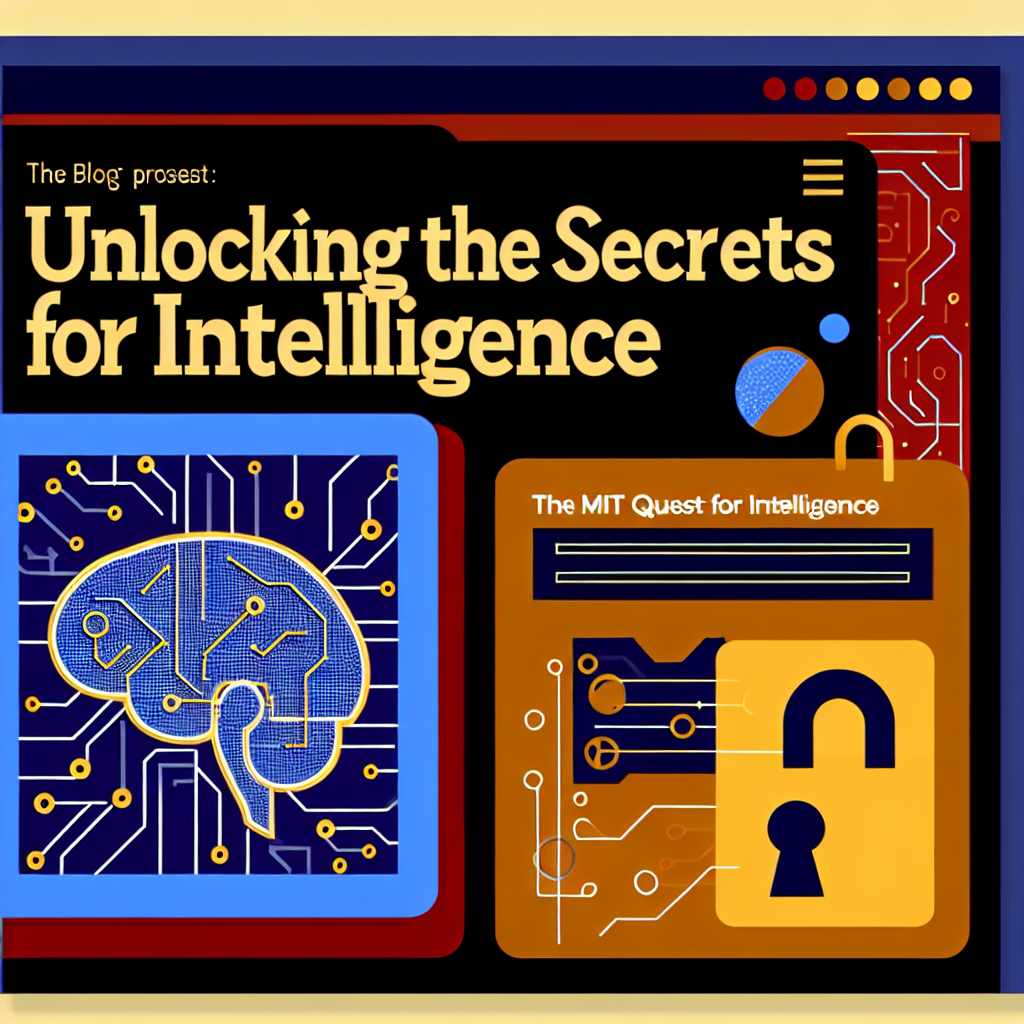Unlocking the Secrets of Intelligence: The MIT Quest for Intelligence

Unlocking the Secrets of Intelligence: The MIT Quest for Intelligence
In today's rapidly advancing technological landscape, the quest to understand and replicate human intelligence stands as one of the most intriguing and ambitious challenges. The Massachusetts Institute of Technology (MIT) has embarked on a groundbreaking initiative, known as the MIT Quest for Intelligence, to explore this very frontier. This blog is tailored for tech enthusiasts, researchers, and students eager to delve into the intersection of artificial intelligence (AI) and cognitive science. Let's uncover how MIT is working to unlock the secrets of intelligence.
Understanding the MIT Quest for Intelligence
The MIT Quest for Intelligence is an ambitious research initiative launched to unravel the complexities of human intelligence and develop intelligent machines. This section will delve into the goals and methodologies of the Quest.
Objectives of the MIT Quest
The Quest aims to:
- Advance AI Research: By understanding the principles of human intelligence, MIT seeks to push the boundaries of AI beyond current capabilities.
- Integrate Cognitive Science: The Quest merges AI with cognitive science to model the human brain more accurately.
- Promote Interdisciplinary Collaboration: It fosters collaboration across various fields such as neuroscience, computer science, and psychology.
Methodological Approach
MIT employs a multidisciplinary approach encompassing:
- Brain-Inspired Models: Developing AI systems that mimic neural processes.
- Data-Driven Insights: Utilizing vast datasets to train and refine AI models.
- Ethical Considerations: Ensuring that AI systems adhere to ethical standards and societal norms.
The Building Blocks: AI and Cognitive Science
To comprehend the Quest's foundation, it's essential to understand the roles of AI and cognitive science. This section provides an overview of these fields and how they converge in the MIT Quest.
Artificial Intelligence
AI involves creating machines capable of performing tasks that typically require human intelligence. Key components include:
- Machine Learning: Algorithms that allow systems to learn from data.
- Natural Language Processing (NLP): Techniques enabling machines to understand and generate human language.
- Robotics: Designing intelligent machines that can perform physical tasks.
Cognitive Science
Cognitive science explores the nature of thought, learning, and mental organization. Core aspects include:
- Neuroscience: Studying the brain's structure and function.
- Psychology: Investigating behavioral patterns and mental processes.
- Linguistics: Analyzing language acquisition and processing.
Convergence in the MIT Quest
By integrating AI with cognitive science, the Quest aims to create systems that are not only intelligent but also adaptable and human-like in their decision-making processes. This convergence allows for:
- Enhanced Learning Models: Systems that learn and adapt in a manner similar to the human brain.
- Improved Human-Machine Interaction: AI that can understand and respond to human emotions and intentions.
Practical Steps in the Quest for Intelligence
This section outlines the practical steps and projects undertaken by MIT in their quest to unlock intelligence.
Developing Brain-Inspired AI
MIT researchers are creating AI systems inspired by the human brain's architecture. The steps include:
- Neural Network Simulation: Using computational models to simulate brain processes.
- Algorithm Optimization: Refining algorithms for better performance and efficiency.
- Feedback Loops: Implementing real-time feedback to enhance learning capabilities.
Collaborative Projects
MIT fosters collaboration through various projects:
- The Intelligence Initiative: A platform for cross-disciplinary research and innovation.
- AI for Social Good: Projects aimed at leveraging AI to address societal challenges like climate change and healthcare.
Ethical AI Development
Ensuring ethical use of AI is paramount. MIT addresses this through:
- Bias Mitigation: Developing techniques to minimize algorithmic bias.
- Transparency: Creating AI systems with transparent decision-making processes.
- Regulatory Compliance: Adhering to legal standards and ethical guidelines.
The Future of Intelligence Research
This section envisions the future trajectory of intelligence research and its potential impact on society.
Long-Term Goals
MIT's long-term goals include:
- Universal AI Systems: Creating AI that is adaptable across various domains.
- Human-Enhancing Technologies: Developing technologies that augment human capabilities.
- Global Collaboration: Fostering international partnerships to advance AI research.
Societal Impact
The Quest's breakthroughs could lead to:
- Revolutionized Healthcare: AI-driven diagnostic tools and personalized medicine.
- Enhanced Education: Adaptive learning systems tailored to individual needs.
- Improved Quality of Life: AI solutions addressing everyday challenges.
Conclusion
The MIT Quest for Intelligence represents a monumental step towards understanding and replicating human intelligence. By blending AI with cognitive science, MIT is paving the way for intelligent systems that could transform society. As the Quest progresses, it holds the promise of groundbreaking discoveries and innovations that will shape the future of technology and humanity.
Related Tools: TensorFlow, PyTorch, MIT OpenCourseWare
Last updated: May 18, 2025